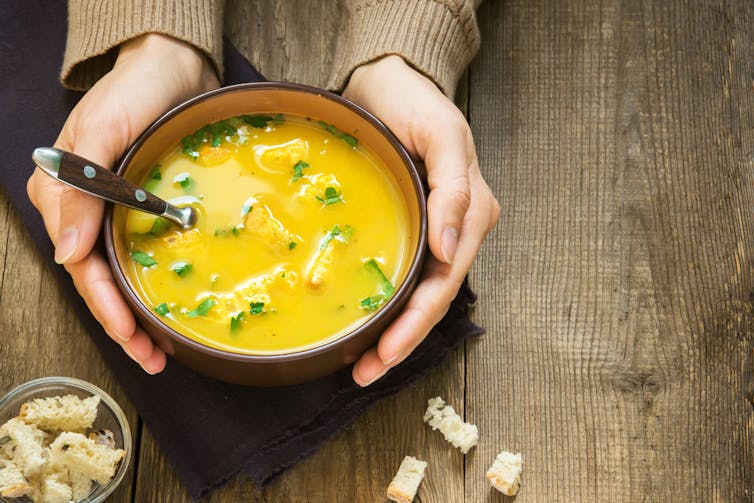It’s winter and many of us find ourselves drawn to bowls of cheesy pasta, oozing puddings, warming soups, and hot chocolate with marshmallows.
These and other comfort foods can make us feel good. But why? And why do we crave them in winter and not in summer?
Research tells us there are three good reasons.
1. The gut ‘speaks’ to the brain
We know from the relatively new field of nutritional psychiatry that our stomachs produce the “happiness chemicals” dopamine and serotonin. When we eat, a complex process involving the brain means these neurochemicals trigger feelings of happiness and well-being.
These happiness chemicals are also produced when we exercise and are exposed to sunlight, which decline in winter.
This results in a change in the fine balance between the good and bad bacteria that live in our stomachs, and consequently, the relationship between the gut and the brain.
So, in winter when we eat our favourite comfort foods, we get a rush of happiness chemicals sent from the gut to our brain and this make us feel happy and content.
2. Evolution may have a hand
The second reason we crave more comfort foods during the winter months could be evolutionary. Before we enjoyed technological advances such as housing, heating, supermarkets and clothing, humans who increased their body weight during winter to keep warm were more likely to survive their environmental conditions. Craving carbohydrate and sugar rich foods was therefore a protective mechanism.
Although we are not still living in shelters or foraging for food today, food cravings in winter may still be programmed into our biology.
3. Psychology, craving and mood
Social learning theory says people learn from each other through observing, imitating and modelling. In the context of food cravings this suggests that what our caregivers gave to us in winter as children has a striking impact on what we choose to eat in winter as adults.
A review of studies on the psychological reasons behind eating comfort food says this food may play a role in alleviating loneliness and boosting positive thoughts of childhood social interaction.
We may also naturally experience lower mood in winter and low mood has been linked to emotional eating.
In winter due to it being darker and colder, we tend to stay indoors longer and self-medicate with foods that are carbohydrate and sugar rich. These types of foods release glucose straight to our brain which gives us an instant feeling of happiness when we are feeling cold, sad, tired or bored.
Comfort food can be healthy
For all the comfort they provide, comfort foods generally receive a bad rap because they are usually energy and calorie dense; they can be high in sugar, fat and refined carbohydrates.
These types of foods are usually linked to weight gain in winter and if you eat too much over the longer term, can increase the risk of heart disease and diabetes.
However, not all comfort foods are created equally, nor are they all bad for our health.

You can get the same comforting feelings from winter foods containing ingredients that are good for you. For example, a hearty bowl of soup with a slice of wholegrain bread can give you all the components you need for optimal physical and psychological health. Steaming bowls of chilli and curries can provide immunity boosting properties with the use of their warming spices. So too are all the wonderful citrus fruits that become available in the winter.
If you are craving something that is carbohydrate rich, try swapping white varieties for wholegrain versions that will dampen carbohydrate cravings. If you crave a hot chocolate try swapping the cocoa powder for cacao which has a higher concentration of vitamins and minerals.
More good news
The good news for all of us who crave comfort foods in winter is studies that assess intuitive eating — eating when you are hungry, stopping when you are full and listening to what your body is telling you to eat — suggest people who eat this way are happier with their body image, feel better psychologically and are less likely to have disordered eating.
So, embrace this wonderful chilly weather. Rug up in your favourite woolly jumper, sit by the fire, cuddle up with a loved one, make some healthier swaps to your classic comfort foods, remove the food guilt and listen to what your body is telling you it needs during these cold winter months.
The authors do not work for, consult, own shares in or receive funding from any company or organisation that would benefit from this article, and have disclosed no relevant affiliations beyond their academic appointment.


